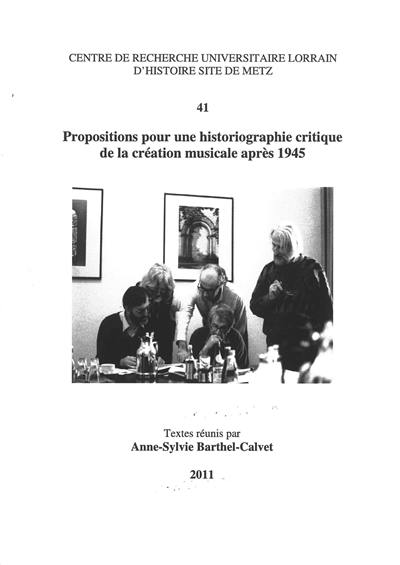
Fiche technique
Format : Broché
Nb de pages : 238 pages
Poids : 400 g
Dimensions : 18cm X 25cm
ISBN : 978-2-85730-048-9
EAN : 9782857300489
Propositions pour une historiographie critique de la création musicale après 1945
Quatrième de couverture
Propositions pour une historiographie critique de la création musicale après 1945
Cet ouvrage collectif rassemble huit contributions issues des journées d'études Historiographie critique de la création musicale après 1945 : enjeux épistémologiques et méthodologiques, qui se sont tenues à l'Université Paul Verlaine-Metz les 9 et 10 septembre 2010. Elles visent à poser les premiers jalons d'une historiographie critique de la production musicale des soixante dernières années et à étudier les discours que ces œuvres ont suscités, et ce, à travers des points thématiques très diversifiés (étude de programmes de concert, problématique de l'édition de textes, analyse de l'élaboration du discours de et autour de compositeurs, apport historiographique des esquisses d'œuvres, éclairage apporté par une documentation exogène au monde musical, conditions de possibilité de l'historiographie d'une œuvre en train de s'élaborer...).
Considérant que la proximité temporelle relative avec leurs objets d'étude permet en fait d'ouvrir des perspectives nouvelles et particulièrement heuristiques, les auteurs apportent, à travers des analyses croisées de documents parfois très hétérogènes, de nouvelles grilles de lecture de ce que l'on peut appeler « l'historiographie canonique » de cette période.
This volume brings together eight articles delivered at the study days Critical Historiography of Musical Creation Since 1945 : Epistemological and Methodological Stakes held at the University Paul Verlaine-Metz on September 9-10, 2010. Together, they aim to pave the way for a critical historiography of musical works of the past sixty years and to study the writings to which these works gave rise. The contributions treat a broad variety of topics including the study of concert programs, the question of publishing texts, the genesis of discourses by or about composers, the ways in which analysing composer's sketches contributes to historiography, new perspectives brought about by documents foreign to the musical world, and the possibility of writing the historiography of a truly contemporary work.
The temporal proximity of these studies with their subjects lends them new and particularly heuristic perspectives, and their authors provide innovative ways of reading what may be called a « canonic historiography » of the second half of the Twentieth Century thanks to the cross analysis of often heterogenous documents.





